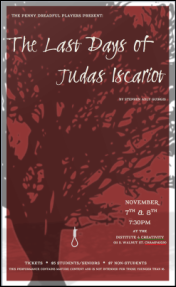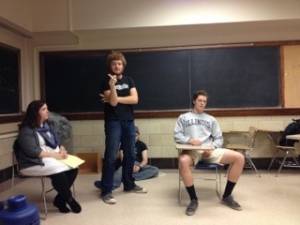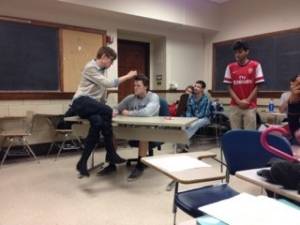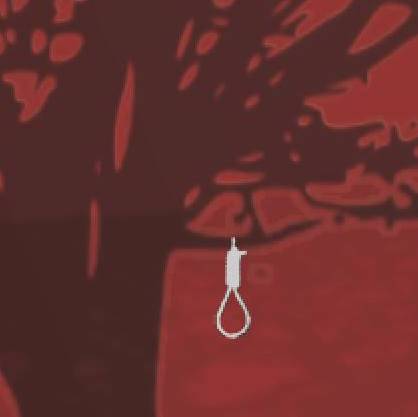I think of theatre as more of an addiction than a passion. With every new show comes “unique” inspiration and excitement. However, for the performer, this excitement wanes about half-way through the process, and, come Tech Week, the feeling seems to resolve itself somewhere between hair-pulling frustration and blood-boiling madness. Then the lights go down, the curtain comes up, and you realize why you’ve been spending the last several months in dank rehearsal halls, sequestered remotely enough that those who love you have long given up looking for you. And sometimes, depending on the show you’re in, it doesn’t even feel that good.
This description of my love-hate relationship with theatre should be taken with a grain of salt: I’ve never been trained to do theatre, per se. I am, however, a graduated member of a special order — an order whose members scrape the spare time found in the nooks and crannies of their schedules and heap it together into a soft mass of drama and stress.
In other words, I used to do Student Theatre.
 Having recently graduated, I have taken to reflecting on my experiences in student theatre. Was it worth it? What did I take away from all the hours spent working and fretting? In order to help me in this examination, I had a conversation with Stephanie Svarz, a Junior in the Theatre Studies program at the University of Illinois. Svarz is the current President of the Penny Dreadful Players student theatre group and director of the upcoming Last Days of Judas Iscariot. A juggernaut in the student theatre arena, Ms. Svarz has committed to refining her craft as a theatre practitioner and bringing theatre to those who might not otherwise have the opportunity to work on or see a play. Perhaps, I thought, talking to her about her new project and her own experiences with Student Theatre would help me.
Having recently graduated, I have taken to reflecting on my experiences in student theatre. Was it worth it? What did I take away from all the hours spent working and fretting? In order to help me in this examination, I had a conversation with Stephanie Svarz, a Junior in the Theatre Studies program at the University of Illinois. Svarz is the current President of the Penny Dreadful Players student theatre group and director of the upcoming Last Days of Judas Iscariot. A juggernaut in the student theatre arena, Ms. Svarz has committed to refining her craft as a theatre practitioner and bringing theatre to those who might not otherwise have the opportunity to work on or see a play. Perhaps, I thought, talking to her about her new project and her own experiences with Student Theatre would help me.
———
Smile Politely: Stephanie, thank you for taking time out of your schedule to talk with me. I know you are a busy individual. Being so busy, how do you balance Student Theatre with your other activities?
Stephanie Svarz: I don’t know. I don’t really consider it an extra. I consider it an extension of my education. It’s putting into practice everything that I’m learning. Homework is done at very strange hours. The key to it is just making sure that I’m focused. I think of it as something that I really love to do. So it doesn’t feel like work or something additional to balance because I really just love doing it.
SP: So if you consider it a part of your education, what do you think you have learned by doing Student Theatre?
Svarz: So much. Project Management, for one. Since it’s student-run theatre, we don’t really have any costume designers or tech people or sound and light designers. Everything that we do, the director really has to initiate. So I’m learning huge things about project management. We have a kid on our team this year who is playing Jesus, and he’s really interested in sound design. So, last night we sat down and worked on the sound design for our show. I’m also learning about managing artistic vision, and what works and what doesn’t with a certain group of people. So everything that you might learn about in a class, in theory, I’m getting to actually put into practice to figure out what works and what doesn’t work. The biggest thing really has been figuring out what failed, and why did it fail, and how can we fix that.
SP: You have been doing Student Theatre for a while now, but you also have had the privilege of working at the Krannert Center. How have you gone about managing the difference between working with “theatre people” and working with people who don’t necessarily do theatre all the time?
 Svarz: It definitely is a huge difference. It’s honestly just a question of efficiency. The people who are in the department want to do this as a profession, while the kids I get to work with are just as passionate about it because it’s something that they love to do. It may not be a full-time career for them, but it’s something that they elect to do because they love it and they really want to get involved. So the passion is there for both sets of people. So it’s honestly just about efficiency. [People at Krannert] can work at an efficient pace, and they understand the language, but it’s fun to work with a group of less experienced individuals because that passion is raw, and it’s fun to shape and harness it. Yeah, we might need a little more time to do that, but they’re just as capable as doing what everyone else in the Theatre Department is doing.
Svarz: It definitely is a huge difference. It’s honestly just a question of efficiency. The people who are in the department want to do this as a profession, while the kids I get to work with are just as passionate about it because it’s something that they love to do. It may not be a full-time career for them, but it’s something that they elect to do because they love it and they really want to get involved. So the passion is there for both sets of people. So it’s honestly just about efficiency. [People at Krannert] can work at an efficient pace, and they understand the language, but it’s fun to work with a group of less experienced individuals because that passion is raw, and it’s fun to shape and harness it. Yeah, we might need a little more time to do that, but they’re just as capable as doing what everyone else in the Theatre Department is doing.
SP: So what show are you currently doing, and why did you decide to do that show?
Svarz: We are doing the Last Days of Judas Iscariot. I got a chance to see it my freshman year of college at Ball State. It always just stuck with me. I really find interesting arguments in it about religion. I really love reading the Bible simply because I find it to be an interesting piece of literature. So, when I took a look at Judas and got to be involved in it, it really made me look at Judas as a character in a different light. He’s a biblical figure who we typically see portrayed in a negative light. So what happens if we strip that all down and take a look at it? This play does a really interesting job of exploring that in a really lively and interesting way and with compelling figures from history. We get to know people that we’ve only read about.
SP: Have any of your cast members talked about their own religious beliefs as they relate to this play?
Svarz: We did a work session about the second week we started the production. We all sat down, and looked at the play. Religious beliefs came up, and there were definitely some kids who were raised in — I can’t judge and say “conservative”—but were definitely devout in their faith. So when we would talk about some of these issues, we would get a lot of “Well, this is what I understand, and this is what I understand,” and so everyone came together to share their beliefs, and I think there was initially some tension. There were some cast members for whom I was like, “This will be challenging what they know” and pushing against whatever they believe. They’ve shared a little bit of their experience and it has wound up being okay. It’s been very cool to explore.
SP: So what are some of the challenges you have come across, not just the religious aspect, but functionally and materially, what are some of the challenges you have come across in this production?
Svarz: It’s also been sort of a challenge working with all levels. I have some kids in the cast who have been doing shows their whole lives. They’ve been with PDP, they’re seniors, they have strong working knowledge. So balancing those people with the kids who have never done a show before in their life — this is the first time they are stepping on stage to say words in front of an audience. I love that. There’s so much learning that happens. And no, these kids don’t necessarily shoot up to the top and are ready to go to Broadway after the end of the show. I think one of the challenges is equalizing that language. To make sure that the people at the top think they are being adequately challenged and they’re getting something really rich out of this experience. The learning — they’re growing as an actor; they’re understanding themselves and their work in the theater better. Because Student Theatre is an elective option, so they don’t have to be doing this. They can leave at any time. So how do I balance everyone getting what they want? Because to learn, or to grow, or to have a fun experience, whatever, I want to make sure they get that.
SP: I know every moment in the show is your “favorite,” but if you had to choose one that maybe surprised you to the extent that it has been a pleasant experience or valuable experience, which one would you choose?
 Svarz: It’s probably the scene at the very end. The second to last scene in the show between Jesus and Judas is one of my favorite scenes that has been written. And it has turned into this incredible, searing moment between two friends, and two people that love each other, and I love that scene. We worked it really hard last night, and where it’s going, it’s only going to go up from here and I’m really excited to see that. We casted a new person to our group to play Pontius Pilate, and he’s awesome, and his energy is off the wall, and every time we do that scene people are laughing and having a great time. The woman who plays Cunningham for our show was saying, “It was so hard for me not to laugh, and every time I’m breaking.” So I think honestly that scene has blossomed and surprised me in what I thought would be just another testimony, and has really turned out to be something compelling and energizing and really revitalizing in the middle of the show to watch.
Svarz: It’s probably the scene at the very end. The second to last scene in the show between Jesus and Judas is one of my favorite scenes that has been written. And it has turned into this incredible, searing moment between two friends, and two people that love each other, and I love that scene. We worked it really hard last night, and where it’s going, it’s only going to go up from here and I’m really excited to see that. We casted a new person to our group to play Pontius Pilate, and he’s awesome, and his energy is off the wall, and every time we do that scene people are laughing and having a great time. The woman who plays Cunningham for our show was saying, “It was so hard for me not to laugh, and every time I’m breaking.” So I think honestly that scene has blossomed and surprised me in what I thought would be just another testimony, and has really turned out to be something compelling and energizing and really revitalizing in the middle of the show to watch.
SP: Now that you’re coming to an idea of what this show is going to be, if you could have the audience take away one thing, or maybe one moment or one thought from this play, what is that one thing you hope they take away?
Svarz: I would say “To be kind and stop judging.” Which might be too simple or whatever, but I think ultimately we need to start taking better care of each other as humans. I think we need an opportunity to reexamine our relationships and say, “Hey, we’re all in this together.” I think people have stopped taking care of each other, and stopped saying to each other, “I see you’re having a really hard time right now, and I’m here for you.” Just for people to say, “I’m here for you” I think is huge. And with Judas, he’s been condemned; he’s been judged as a man who cheated out his friend; he’s a traitor. I think this story does a really beautiful job of saying how things aren’t black and white, how we need to stop judging each other and stop saying, “This is a bad person, this is a good person,” because there’s so much behind that. So honestly, I would like people to leave with the feeling that we understand each other better, rather than passing judgment at the drop of the hat. I would really like to use this play as a meditation on that, on a meditation on openness, and acceptance, of looking at each other instead of blowing by each other.
———
The Last Days of Judas Iscariot is a play about a man who is on trial for betraying his friend. In a similar fashion, talking to Stephanie was much like putting student theatre on trial. Is it worth it? Is it good? What’s its purpose? What’s to gain? Getting an opportunity to talk to her has really shaped the way that I look at my own experiences.
Student theatre is an opportunity to grow and develop what you’ve been learning in the classroom. It’s an opportunity to work on your leadership abilities. It’s an opportunity to grow or challenge your ideas on sensitive topics like religion. It’s an opportunity to share an unfamiliar art form with an audience who might not otherwise be exposed to it. Student theatre is worth it, for practitioners and audience members alike.
I will be attending The Last Days of Judas Iscariot this Friday, November 7th at 7:30 p.m. They will also have a second show at the same time on November 8th. It will be performed at the Institute 4 Creativity at 111 S. Walnut St. Champaign. Tickets are $5 for Students, and $7 for non-students. You should go. Trust me, it’ll be worth it.
Rehearsal photos courtesy of Stephanie Svarz.








